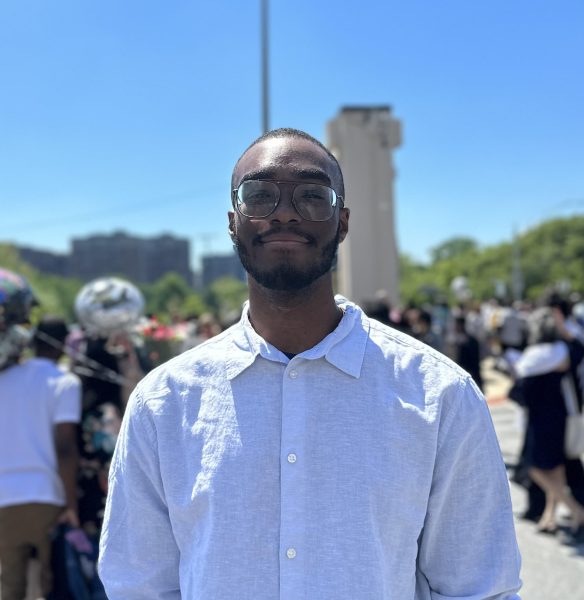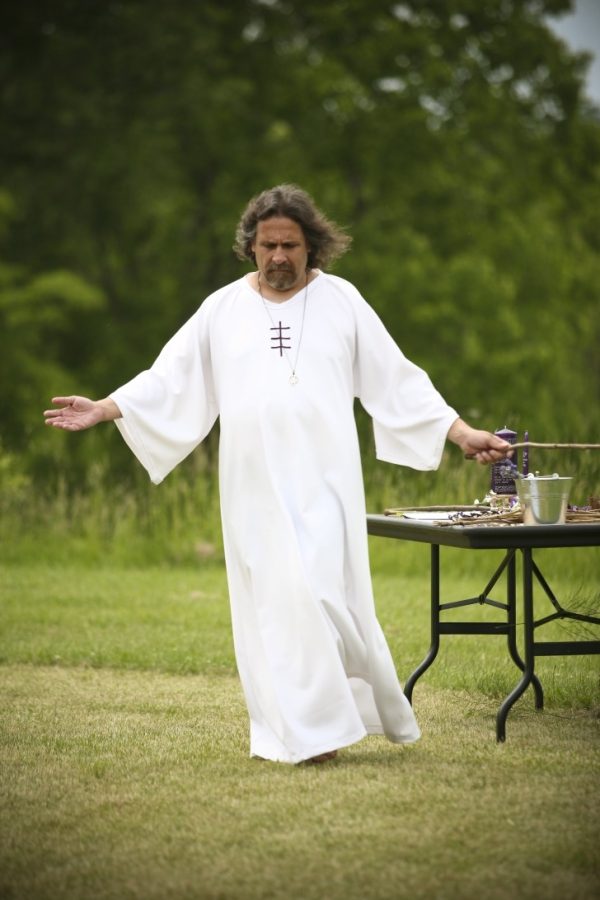Neo-Paganist Guest Shares Views Of His Faith To Mercy Community
Jean Pagano, the archdruid of a neopagan church, arrived at Mercy College virtually as a guest speaker on Oct. 11 to discuss how he found his faith, the typical religious rituals he practices, and the unfortunate misconceptions surrounding the ancient religion.
Paganism, according to Pagano, is an offering-based faith that “existed before it was replaced by what we call Abrahamic faiths: Judaism, Christianity, and Islam. These religions supplanted polytheism, neopaganism is just a return to paganism and the belief in the old gods.”
However, Pagano did clarify that neopaganism is necessarily a complete return to the ancient practices performed at the time.
“I think for the most part we really don’t know what that really means and looks like,” said Pagano. “We have some ideas, but nothing definitive at all.”
Jean Pagano, who also goes by the name Drum, was elected as the sixth archdruid of the church Ár nDraíocht Féin (ADF) in April of 2016.
As an archdruid, Pagano acts as the chairman of the board for ADF and head of the clergy council, which sets religious policy for the organization. The council has 35 priests in total.
The clergy council holds virtual meetings every two weeks to discuss ordinary business and “reach out to people who have prayer needs, need help with studies, or have questions.”
But long before his duties as archdruid and his journey into Druidry, he was raised by his French parents as a Roman Catholic in the city of Chicago. However growing up, he admits to feeling a disconnect from the religion that his family followed.
“I think I was religious, but not in the traditional sense. I went to church, but it really didn’t make an impression on me.”
Pagano recalls a moment in his childhood when he was at his catholic church attending a Latin mass. This religious tradition simply “didn’t really speak to me.”
“So here I was, a little kid, sitting in a pew and I have no idea what they’re saying up there. They have their backs turned to the audience, speaking in Latin.”
Pagano also noted feeling a sense of fear when first walking through the doors of the church.
“This is in no way a criticism, but when I first walked in the door there was this man who was crucified on this cross. I’ve come to understand symbolic value over time, but as a child, it scared me.”
As his childhood carried on, Pagano continued feeling detached from his family’s religion. But he did however find within himself a connection to the natural world but he “didn’t have a name for it.”
Pagano looked back at a time when in middle school he was introduced to the pantheon of Greek gods and was immediately drawn into the mythology.
“I had a quiz where one of the questions asked ‘are the Greek gods still worshiped today?’ I said it was true. The paper came back and it said false and I couldn’t believe it, this doesn’t make sense to me.”
Later in high school, he began focusing on his own spiritual practices but still didn’t have a label for what he was working towards. During this time he found a 1969 book titled “View of Atlantis”, written by John Michell.
“In the book, he described paganism as the religion that existed before Christianity. And I was like ‘wow, it has a name.’ That was an essential moment for me to finally find a name for what I believed.”
 This discovery led Pagano down a path towards researching the subject of paganism more and eventually finding a book that would change his life.
This discovery led Pagano down a path towards researching the subject of paganism more and eventually finding a book that would change his life.
“Drawing Down the Moon,” a 1979 book written by Margot Adler, is considered the most seminal work on neopaganism.
The title comes from a “term used in Wicca or witchcraft where during moon rituals the idea is to pull the moon down into the practitioner.”
In the book, Adler described “in great detail a very broad overview of neopagan groups from A to Z. What I found intriguing about it was that when I came to the part about the Reformed Druids of North America (RDNA). When I read what they were about, it sounded like it could be me. And so I wrote to Isaac Bonewits (the leader of the organization) and I said ‘Hey, I’d like some information on RDNA.”
Bonewits gave all the information he had, including the fact that he was forming a new group that would become the ADF. Bonewits invited Pagano to join and he happily joined.
Over time, Pagano rose through the ranks of the church.
“I joined the board of directors in 2009 for a different task that was called a regional druid. Pagano eventually became the Vice-Archdruid and then when the Archdruid stepped down I ran for election and won the position.”
But now did his parents, both Roman Catholics, react to this evolution?
He said that originally, they didn’t understand what Pagano’s new faith was. They had several questions and common misconceptions about what modern pagans actually do. But later on, he started to see a change.
“I think they were supportive in a cautious way. They were cautious people.”
He went on to explain that both of his parents found an interest in his religion before he was even involved with the ADF, which surprised him.
“My mother told me how she was intrigued by the stories of druids using a sickle to cut the mistletoe off the top of oak trees. And my father said he also had positive thoughts about Druidry when he was a child. And that surprised me because I didn’t know that would be something they were aware of.”
Pagano then discussed more generally the common misconceptions surrounding paganism and his views on how paganism is portrayed in the media. Pagano said that questions like do you sacrifice babies, wear black robes, and worship the devil in the woods are some of the first questions that people ask.
It can be argued that films like 1973’s The Wicker Man and other films portraying paganism have painted a negative picture of that religion.
But Pagano and the neo-paganism movement overall have seen a shift in this.
“I think as a movement we were more sensitive about it in the past,” Pagano said. “Where witches and neopagans were portrayed in a negative light. But generally, the portrayals are fairly positive or neutral. I think the portrayals have gotten better over the years, I think people are a little more used to the idea.”
But unfortunately, not everyone is used to the idea just yet. During outdoor festivals and rituals, Pagano and the ADF have had to deal with men and women who scream out Bible passages at them.
However, instead of ignoring these ignorant acts or getting annoyed with them, Pagano has found a healthy way of dealing with them.
“My approach to that is to invite them to come and watch what we do. And I think we’ve had very positive reactions. Some people are afraid and fear is a strong emotion so they tend to stay away, But others who come and see what we do see that it’s just another religious service.”
He went on to say that “hopefully it’s diminishing over time but it depends on the political and societal winds of the times.”
This openness to invite others from a different faith to allow them to learn and find an appreciation for their similarities as well as their differences is something that the ADF finds an important lesson.
Pagano discussed a specific educational course his church has where an individual wanting to become a senior priest must analyze other religions and go to other churches that were unlike the ADF and compare their ceremonies. Pagano chose to go to a “conservative Jewish synagogue and a Catholic church.”
There, he learned the universal truth that ritual is ritual. “So, there are similarities but I think our approach is different. Communal sharing, whether it’s prayer or an offering or things of that nature, is found everywhere. Otherwise, they are very different practices. Paganism is a nature-based religion and the Abrahamic faiths are really about prophets.”
The ADF currently has about 1,200 members on six different continents. And in the United States, Pagano estimates that there are roughly a million currently practicing paganism. So, compared to other Abrahamic religions, it is still a minority faith.
However, if anyone finds interest in neo-paganism, there are many roads to walk down that will lead them to what they seek, he says. Especially since the internet has made paganism more accessible than it has ever been in all of history.
Pagano pointed out the importance of finding reliable websites and or Facebook groups to join to understand the religion.
“I would go out there and see what they have to offer. There’s lots of free information. I would be cautious of people who want to charge you for knowledge.”

Maleek Munroe is a senior at Mercy College, majoring in communications. He graduated Nyack High School, where he found his love and passion for both...








